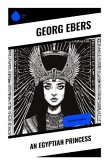In "Homo Sum," Georg Ebers presents a compelling narrative that deftly intertwines elements of historical fiction with an exploration of complex philosophical themes. Set against the rich backdrop of ancient Egypt, the novel grapples with the nature of humanity, identity, and the moral dilemmas faced by individuals in a rapidly changing world. Ebers's vivid descriptions and meticulous attention to historical detail showcase his mastery of the narrative form, while his character-driven storytelling invites readers to engage deeply with the existential questions posed throughout the text. Georg Ebers, a prominent German Egyptologist and novelist, draws heavily on his extensive knowledge of ancient cultures and their literatures. His passion for archaeology and historical accuracy is reflected in his writing, imbuing his characters with a sense of authenticity that resonates with the distinct socio-political dynamics of their era. Ebers erases the boundaries between history and fiction, painting a portrait of the human condition that is rich in both context and meaning, which is likely influenced by his professional pursuits in Egyptology. "Homo Sum" is highly recommended for scholars and readers alike who seek an evocative blend of human experience and historical insight. Ebers's poignant exploration of what it means to be human remains remarkably relevant, inviting reflection on contemporary societal challenges. This novel not only entertains but also provokes thought about the fundamental questions of existence, making it a timeless read.
Bitte wählen Sie Ihr Anliegen aus.
Rechnungen
Retourenschein anfordern
Bestellstatus
Storno








